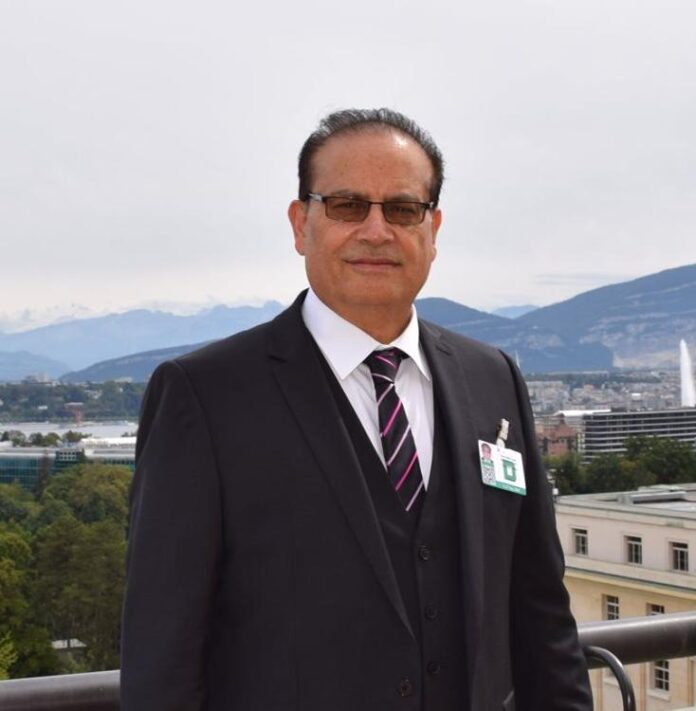By Qamar Bashir
The Middle East has long been the epicenter of conflict, betrayal, shifting alliances, and global maneuvering. Yet the most recent chapter has revealed not just another tragic confrontation, but a sophisticated, high-intensity, high-stake game where every move was calculated to achieve both destruction and survival. The sequence began with Hamas’s surprise attack on Israel—an operation described by some analysts as clumsy and poorly coordinated, yet one that, paradoxically, many claim was abetted by Israel itself to trigger a wider conflict. What followed was a brutal escalation that saw Gaza reduced to rubble, its people starved, slaughtered, and collectively punished under what international observers called nothing less than genocide.
The early days of the war set the stage for Israel’s long-held expansionist ambition: to annex Gaza, the West Bank, and potentially extend its dominance into the broader Middle East. With the United States’ unconditional backing, Israel unleashed a campaign that turned Gaza into what one doctor called a “slaughterhouse,” where children, women, doctors, and civilians were killed daily in horrifying numbers. This genocidal spectacle shocked the world and forced international powers to take sides.
China and Russia limited their involvement largely to issuing statements, avoiding direct entanglement. The real surprise came from Europe. Under immense public pressure, European governments pivoted dramatically. Citizens poured into the streets demanding sanctions against Israel, recognition of Palestine as a state, and an end to the occupation. Governments responded by canceling military, civilian, and economic agreements with Israel, withdrawing investments, and promising support for a two-state solution. This groundswell of European public opinion became a turning point. For decades, Israel had enjoyed near-total impunity in Western capitals, but this time the moral force of public condemnation began to erode even the most entrenched political loyalties. One decisive moment came when a prominent European leader flew to Israel, not to offer support, but to confront its leadership, creating diplomatic shockwaves and forcing new pressure on Tel Aviv.
Equally astonishing was the role of the Muslim world. Long criticized for division and inaction, the Muslim ummah displayed unprecedented cohesion. Iran, while vilified as a sponsor of Hamas, proved its influence by supporting Palestinian resistance and deterring Israel and the United States from full-scale regional escalation. The collective strength of Muslim nations, particularly through economic and diplomatic channels, became a bargaining chip powerful enough to push the United States toward reconsidering its position.
Amid this turmoil, President Donald Trump played what many now describe as one of the most intelligent and strategic diplomatic games of his career. Historically, U.S. presidents have been tethered to Israel’s narrative, often adopting regime-change agendas across the Middle East at Israel’s urging. Netanyahu, for example, loudly advocated regime change in Iran, Syria, Iraq, and Libya. But Trump deviated sharply from this script. He refused to endorse Netanyahu’s ambition to annex Gaza and the West Bank, despite widespread support for the idea within Israel’s parliament and public opinion. He rejected calls for regime change in Iran, signaling that Washington would no longer be manipulated into destabilizing yet another regional power. For Israel, this was an unprecedented betrayal. For the world, it was a signal that America might finally be pulling back from decades of Middle Eastern entanglements.
Trump’s stance marked a turning point. It reflected not only his desire to assert American independence from Israeli influence but also his recognition that the United States could not afford endless wars while its economy and political institutions were under strain. His 21-point peace plan became the centerpiece of this recalibration—a plan that sought not only to stop the carnage in Gaza but also to end centuries of conflict by pushing for a viable two-state solution. When Trump unveiled the plan, many dismissed it as fragile, unrealistic, and destined to fail. Yet, against all odds, it gained momentum. The plan’s strength lay not in forcing capitulation but in balancing interests. It acknowledged Hamas as a legitimate political actor—something Israel had long resisted—and compelled Israel to sit at the same negotiation table as its sworn enemy.
In an unprecedented development, Hamas and Israel accepted the first phase of the plan. This meant an agreement to a ceasefire, humanitarian access to Gaza, and recognition of Palestine’s right to statehood in principle. The agreement is expected to be formally signed in Egypt, with Trump himself likely attending the ceremony. This moment is remarkable not only for its symbolic power but also for its practical implications. For the first time in decades, Israel was forced to concede to negotiations that recognized Palestinians as equal stakeholders. Trump’s ability to leverage European sanctions, Muslim unity, and American political will into one cohesive push was a rare alignment of global forces.
The immediate outcome of the plan is the cessation of the most brutal phase of the Gaza war. Yet its long-term implications are far more significant. If implemented fully, it could establish a two-state solution with Palestine gaining international recognition and sovereignty, force Israel to halt annexation and ethnic cleansing policies, rebalance U.S. foreign policy away from blind loyalty to Israel, strengthen European political autonomy, and reinforce Muslim nations’ influence as collective economic and diplomatic actors in global politics.
Nevertheless, challenges remain. Israel’s political establishment continues to resist, with Netanyahu lobbying fiercely to derail the plan and push the United States back into alignment with Israel’s hardline agenda. Doubts persist about Hamas’s ability to transform from an armed resistance group into a reliable political entity. Skeptics also question Trump’s capacity to maintain momentum given domestic pressures and the fragility of international alliances. Yet despite these uncertainties, the peace plan represents a monumental shift. It demonstrates that even in a region as complex and conflict-ridden as the Middle East, diplomacy, economic leverage, and public opinion can achieve what decades of war could not.
Credit for this breakthrough belongs to multiple actors. Trump’s strategic deviations from Israel’s traditional influence were decisive. Europe’s citizens, by refusing to remain silent in the face of genocide, forced their governments into action. Muslim nations, particularly Iran, used their strength to tilt the balance. International institutions such as the UN and the International Court of Justice provided moral legitimacy by condemning Israel’s actions and upholding Palestinian rights. Even Pakistan’s diplomats, often overlooked, played a vital role in mobilizing the Muslim world and countering Israeli-American propaganda at the United Nations. Conversely, China and Russia, despite their global stature, remained largely on the sidelines—issuing statements but contributing little. Their absence highlights a critical lesson: in this conflict, words without action mean little.
The Middle East has endured millennia of bloodshed, with the Israeli-Palestinian conflict at its modern heart. Yet the alignment of international outrage, Muslim unity, European pressure, and Trump’s uncharacteristically disciplined diplomacy has produced a fragile but real chance for peace. The 21-point plan is not merely a blueprint for ending one war; it is a test of whether humanity can finally prioritize justice and coexistence over expansion and annihilation. If the plan succeeds, it will not only be remembered as Trump’s greatest diplomatic achievement but also as the moment when the world finally forced Israel and Palestine to imagine peace. If it fails, it will join the long list of shattered hopes in the Middle East. For now, however, the world stands at a rare crossroads—one where the slaughter has paused, the diplomacy has begun, and the possibility of justice has flickered into view.
By Qamar Bashir
Press Secretary to the President (Rtd)
Former Press Minister, Embassy of Pakistan to France
Former Press Attaché to Malaysia
Former MD, SRBC | Macomb, Michigan, USA

















